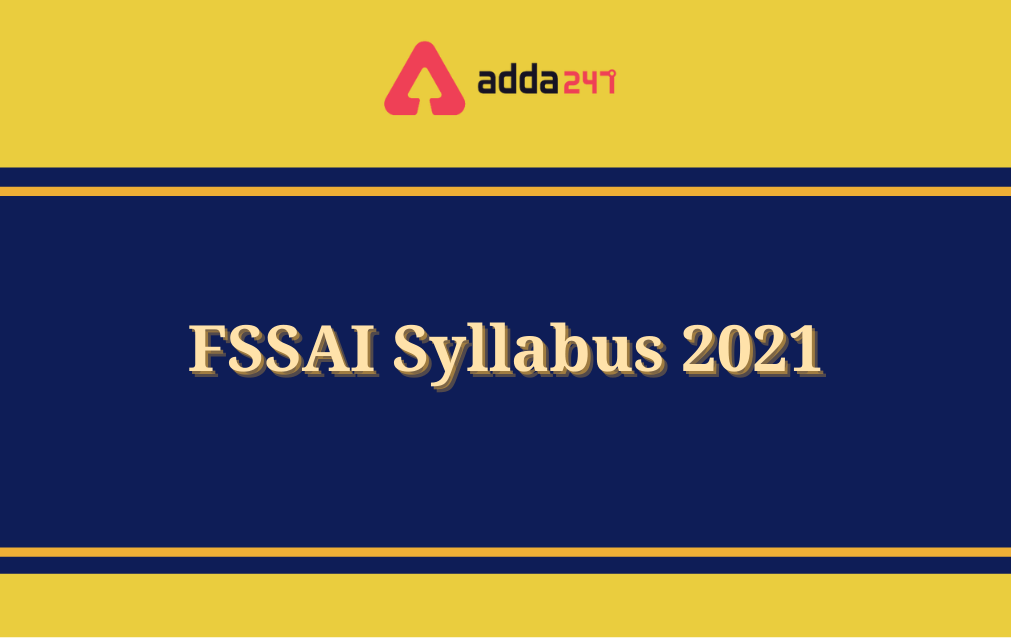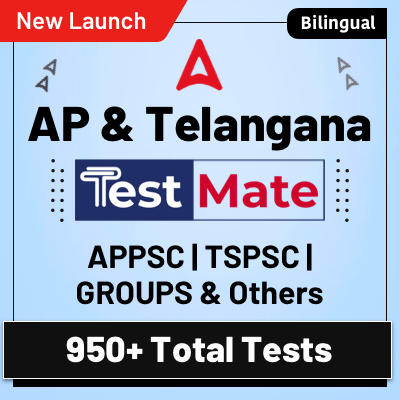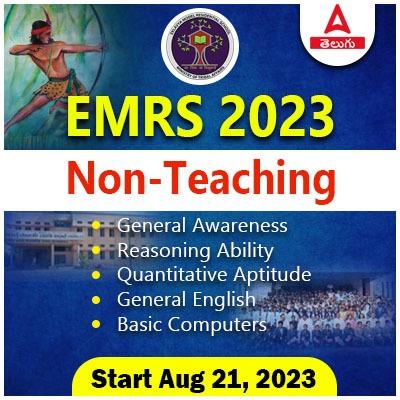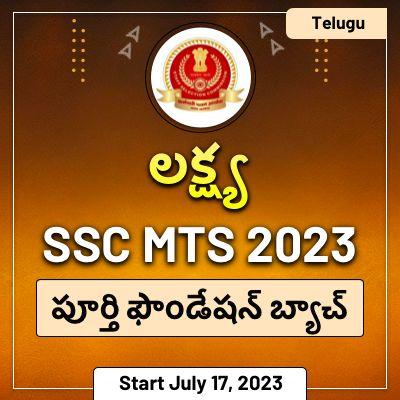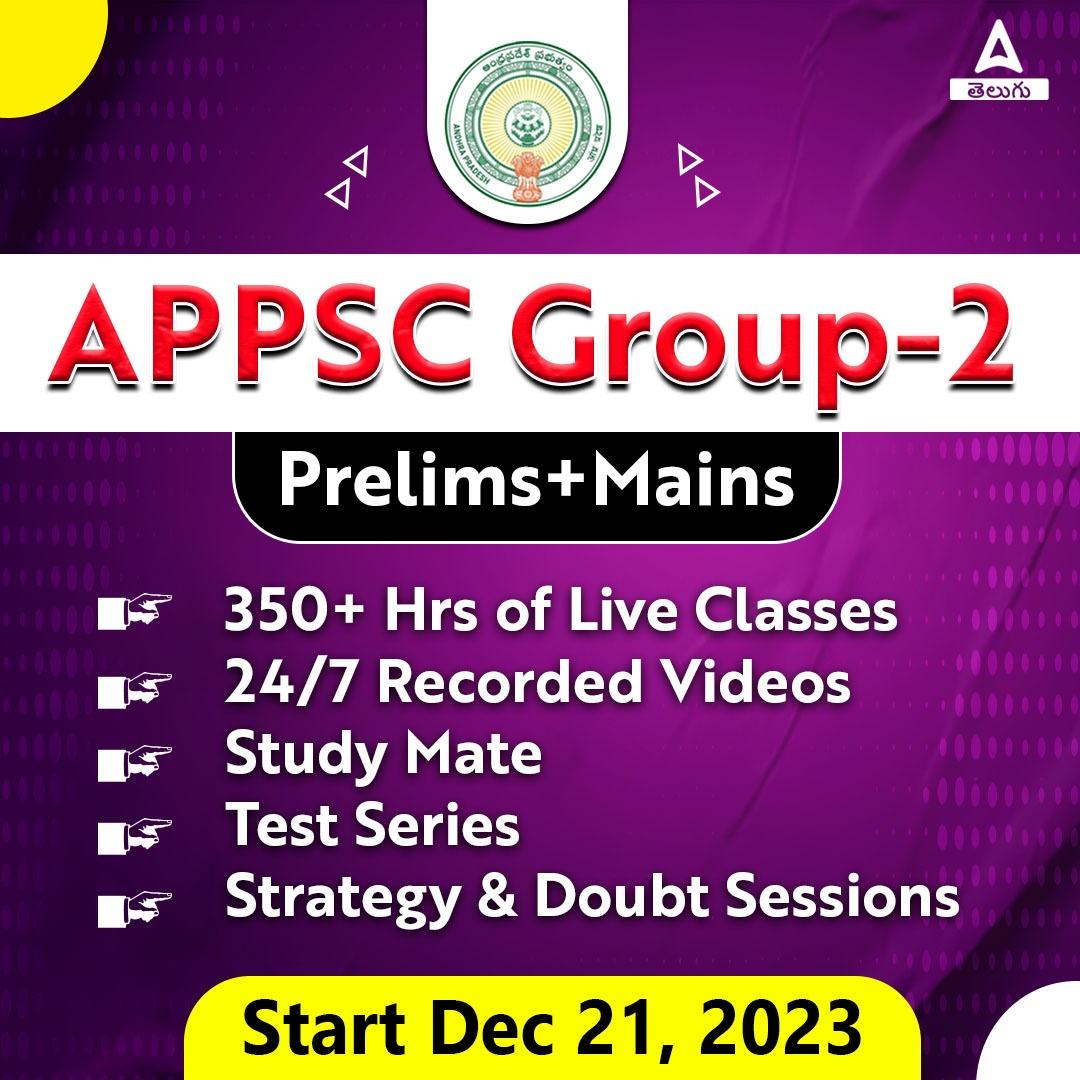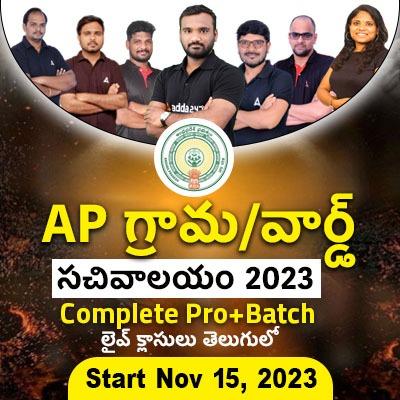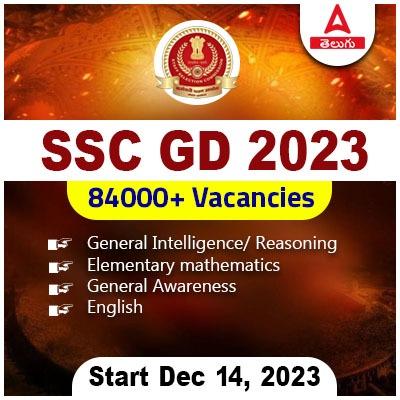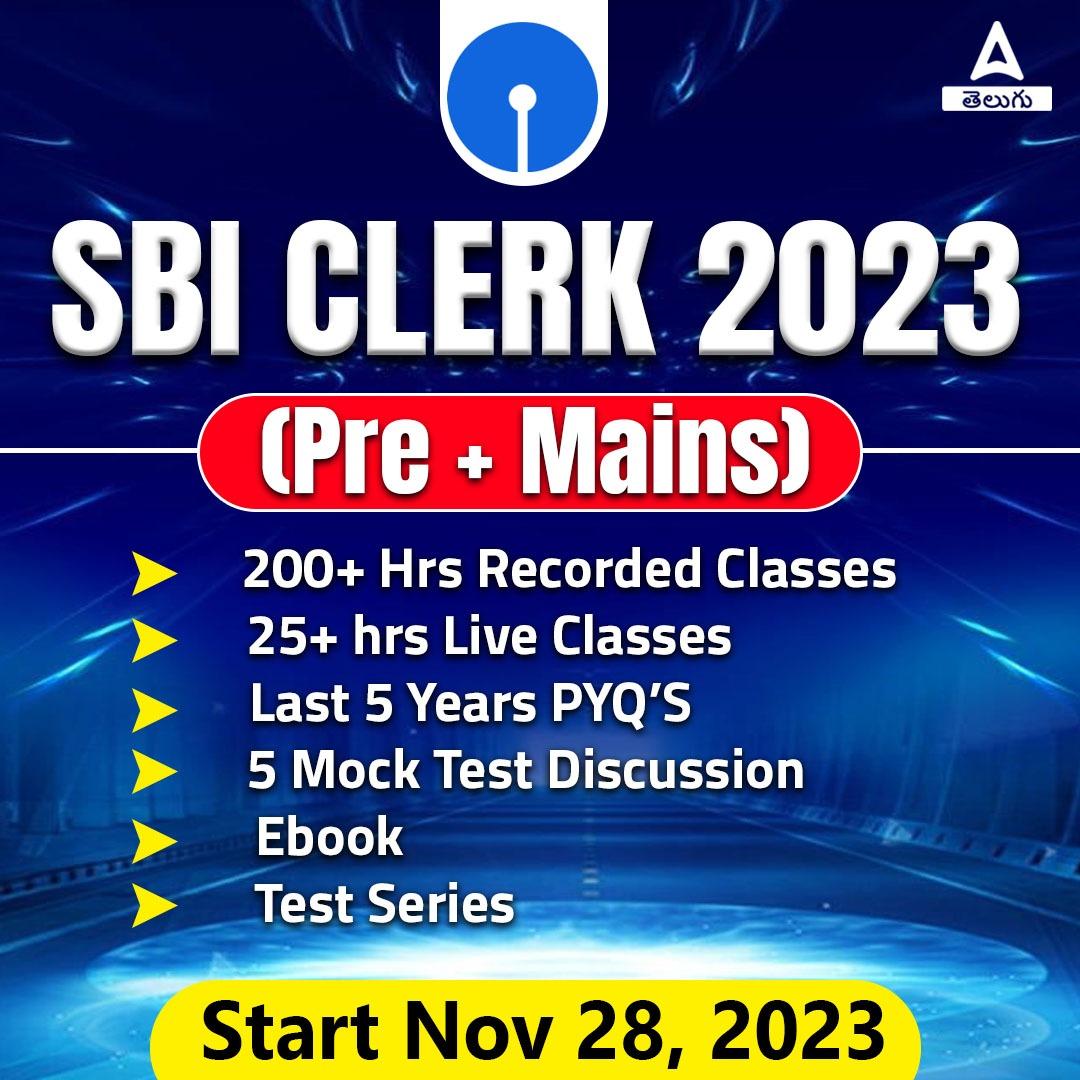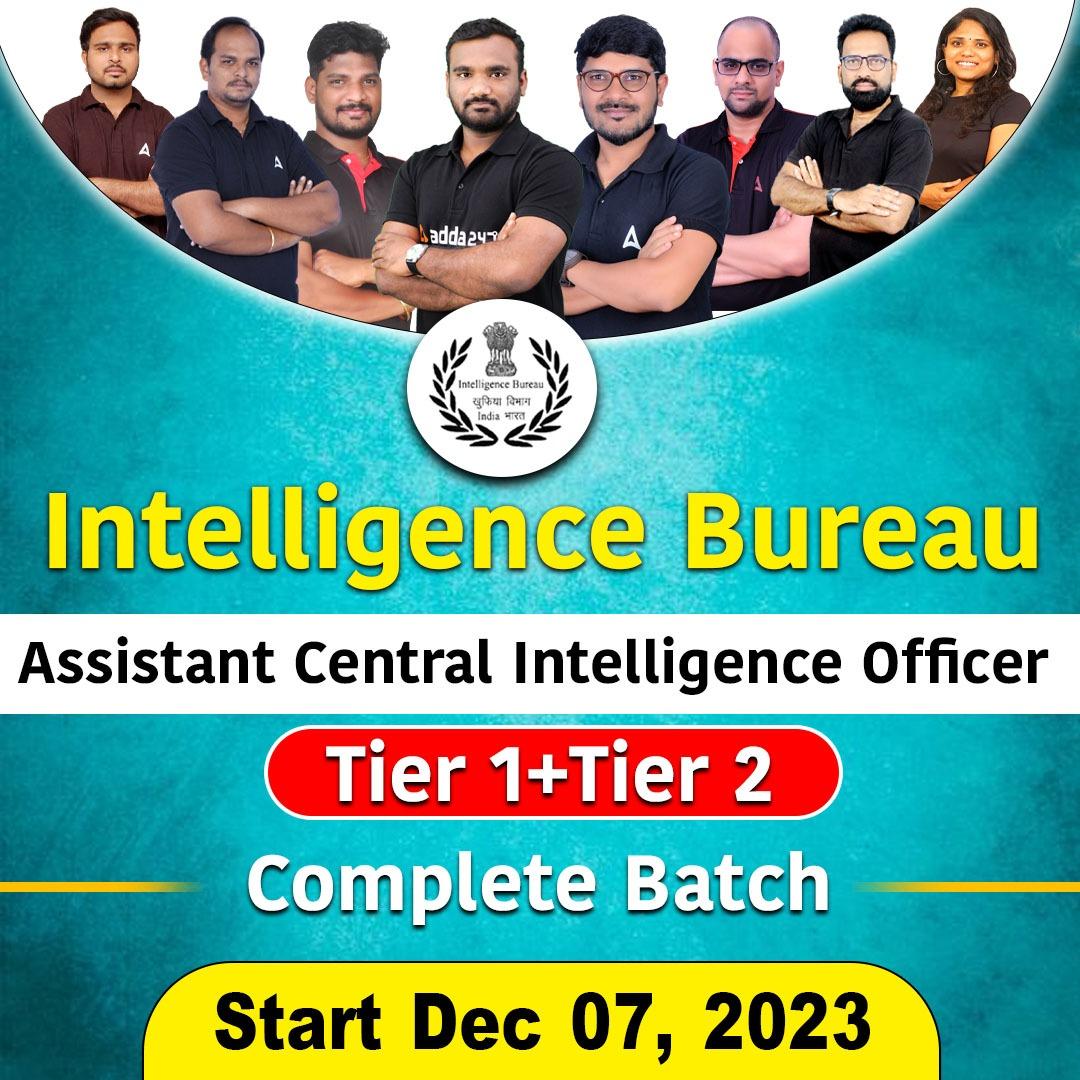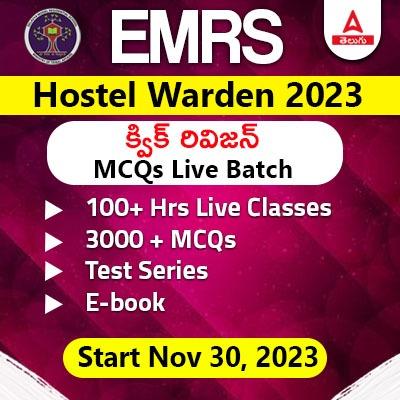FSSAI Syllabus 2021| FSSAI సిలబస్ 2021, పోస్టువారీగా పరీక్ష విధానం మరియు సిలబస్ వివరాలు : ఫుడ్ సేఫ్టీ అండ్ స్టాండర్డ్స్ అథారిటీ ఆఫ్ ఇండియా వివిధ పోస్టుల కోసం ఇటీవల నోటిఫికేషన్ను విడుదల చేసింది. అంటే టెక్నికల్ ఆఫీసర్, సెంట్రల్ ఫుడ్ సేఫ్టీ ఆఫీసర్, అసిస్టెంట్, ఫుడ్ అనలిస్ట్, డిప్యూటీ మేనేజర్ మొదలైన ఉద్యోగాలకు FSSAI మొత్తం 254 ఖాళీలను విడుదల చేసింది; మేము ఈ వ్యాసంలో అన్ని FSSAI Syllabus and Exam Pattern గురించిన పూర్తి వివరాలు అందించాము. పోస్ట్ను బట్టి ఫంక్షనల్ నాలెడ్జ్ నుండి ఎక్కువ ప్రశ్నలు అడగబడతాయి మరియు ప్రతి పోస్ట్కి రీజనింగ్, ఆప్టిట్యూడ్, కంప్యూటర్ లిటరసీ మరియు జనరల్ అవేర్నెస్ సాధారణ విభాగాలుగా ఉంటాయి.
FSSAI Syllabus 2021| సిలబస్
సిలబస్ మరియు పరీక్షా సరళిని తనిఖీ చేయడానికి అభ్యర్థులు ఈ పేజీని బుక్ మార్క్ చేయమని సలహా ఇస్తున్నాము. ఎందుకంటే ఇవి FSSAI 2021 పరీక్షకు కావలసిన పూర్తి సమాచారం అందిస్తుంది. మీరు సిలబస్ మరియు పరీక్షా సరళిని పూర్తిగా తెలుసుకుంటే పరీక్ష గురించి మీకు స్పష్టత వస్తుంది మరియు వ్యూహాన్ని రూపొందించడంలో మీకు సహాయపడుతుంది.
| FSSAI Syllabus 2021 | |
| Recruitment Body | Food Safety and Standards Authority of India |
| Post Name | Group A and other posts |
| Category | Syllabus |
| Exam Level | Central |
| Mode of Exam | Online |
| Marking Scheme | 4 marks for each |
| Negative Marking | 0.25 marks |
| Selection Process | Written Test -Interview |
| Official Website | www.fssai.gov.in |
FSSAI ఆన్లైన్ దరఖాస్తు కొరకు ఇక్కడ క్లిక్ చేయండి
FSSAI Exam Pattern| పరీక్షా విధానం
పోస్టు ప్రకారం పరీక్షా విధానం క్రింద మీకు ఇవ్వడం జరిగింది
Exam Pattern for Assistant Director (Technical), Technical Officer, and CFSO
- ప్రశ్నా పత్రం రెండు భాగాలుగా ఉంటుంది.
- 120 ఆబ్జెక్టివ్ MCQ తరహా ప్రశ్నలు ఉంటాయి
- వ్యవధి 180 నిమిషాలు ఉంటుంది.
- ప్రతి సరైన సమాధానానికి 4 మార్కులు ఇవ్వబడతాయి
- ప్రతి తప్పు సమాధానానికి 1 మార్కు కోత విధిస్తారు
| Subject | No. of Questions | Duration |
| General Intelligence | 10 | 180 Minutes
|
| English Language | 10 | |
| General Awareness | 10 | |
| Computer Literacy | 10 | |
| FSSAI(Functional knowledge) | 80 | |
| Total | 120 |
Exam Pattern for Assistant Manager (IT) & IT Assistant
- ప్రశ్నా పత్రం రెండు భాగాలుగా ఉంటుంది.
- 120 ఆబ్జెక్టివ్ MCQ తరహా ప్రశ్నలు ఉంటాయి
- వ్యవధి 180 నిమిషాలు ఉంటుంది.
- ప్రతి సరైన సమాధానానికి 4 మార్కులు ఇవ్వబడతాయి
- ప్రతి తప్పు సమాధానానికి 1 మార్కు కోత విధిస్తారు
| Subject | No. Of Questions | Duration |
| General Intelligence | 10 | 180 Minutes |
| English Language | 5 | |
| General Awareness | 10 | |
| FSSAI(Functional knowledge) | 95 | |
| Total | 120 |
Exam Pattern for Assistant & Junior Assistant Grade-I
- ప్రశ్నా పత్రం రెండు భాగాలుగా ఉంటుంది.
- 120 ఆబ్జెక్టివ్ MCQ తరహా ప్రశ్నలు ఉంటాయి
- వ్యవధి 180 నిమిషాలు ఉంటుంది.
- ప్రతి సరైన సమాధానానికి 4 మార్కులు ఇవ్వబడతాయి
- ప్రతి తప్పు సమాధానానికి 1 మార్కు కోత విధిస్తారు
| Subject | No. Of Questions | Duration |
| General Intelligence | 20 | 180 Minutes |
| Quantitative Aptitude | 20 | |
| English Language | 10 | |
| General Awareness | 20 | |
| Computer Literacy | 25 | |
| FSSAI – Role, Functions, Initiatives (A General Understanding) | 25 | |
| Total | 120 |
Exam Pattern for Personal Assistant
- ప్రశ్నా పత్రం రెండు భాగాలుగా ఉంటుంది.
- 120 ఆబ్జెక్టివ్ MCQ తరహా ప్రశ్నలు ఉంటాయి
- వ్యవధి 180 నిమిషాలు ఉంటుంది.
- ప్రతి సరైన సమాధానానికి 4 మార్కులు ఇవ్వబడతాయి
- ప్రతి తప్పు సమాధానానికి 1 మార్కు కోత విధిస్తారు
| Subject | No. Of Questions | Duration |
| General Intelligence & Reasoning | 20 | 180 Minutes
|
| General Awareness | 20 | |
| Computer Literacy | 25 | |
| Quantitative aptitude | 20 | |
| English Language & Comprehension | 10 | |
| FSSAI – Role, Functions, Initiatives | 25 | |
| Total | 120 |
Exam Pattern for Hindi Translator
- ప్రశ్నా పత్రం రెండు భాగాలుగా ఉంటుంది.
- 120 ఆబ్జెక్టివ్ MCQ తరహా ప్రశ్నలు ఉంటాయి
- వ్యవధి 180 నిమిషాలు ఉంటుంది.
- ప్రతి సరైన సమాధానానికి 4 మార్కులు ఇవ్వబడతాయి
- ప్రతి తప్పు సమాధానానికి 1 మార్కు కోత విధిస్తారు
| Subject | No. Of Questions | Duration | |
| Paper I | General Intelligence | 10 | 180 minutes |
| Quantitative Aptitude | 10 | ||
| General Awareness | 10 | ||
| Computer Literacy | 10 | ||
| FSSAI – Role, Functions, Initiatives | 20 | ||
| Paper-II | Subject matter of translation (Objective) | 60 | |
| Total | 120 | ||
Deputy Manager, Assistant Manager
- ప్రశ్నా పత్రం రెండు భాగాలుగా ఉంటుంది.
- 120 ఆబ్జెక్టివ్ MCQ తరహా ప్రశ్నలు ఉంటాయి
- వ్యవధి 180 నిమిషాలు ఉంటుంది.
- ప్రతి సరైన సమాధానానికి 4 మార్కులు ఇవ్వబడతాయి
- ప్రతి తప్పు సమాధానానికి 1 మార్కు కోత విధిస్తారు
| Subject | No. Of Questions | Duration |
| General Intelligence | 10 | 180 Minutes |
| General Awareness | 10 | |
| Computer Literacy | 10 | |
| FSSAI(Functional knowledge) | 10 | |
| Subject matter knowledge | 80 | |
| Total | 120 |
FSSAI Syllabus 2021- Detailed Syllabus | పూర్తి సిలబస్ వివరాలు
Part A: General Aptitude
General Intelligence:
- Analogies
- Similarities and differences
- Space visualization
- Problem-solving
- Analysis, judgment, decision making
- Visual memory
- Discriminating observations
- Relationship concepts
- Arithmetical reasoning
- Verbal and figure classification
- Arithmetical number series
- Non-verbal series etc.
General Awareness
- Environment and its application to society.
- Knowledge of currents events and matters of everyday observation
- India and neighbouring countries especially pertaining to History, Culture, Geography, Economic scene, General Polity including Indian Constitution, sports and scientific research, etc.
English language Comprehension
- Vocabulary
- Grammar
- Would include questions on comprehension
- One word substitution
- Synonyms and antonyms
- Spelling error, spotting errors in sentences
- Grammar – noun, pronoun, adjectives, verbs, prepositions, conjunctions, use of ‘a’ ‘an” and ‘the’, idioms and phrases, etc.
- Parts of Speech
Computer Literacy
- Knowledge of MS office (word, excel, PowerPoint) including basic commands
- Google Doc, emails
- Commonly use social media handles (Whattsapp, FB, Twitter, etc)
Part B: Functional Knowledge
Indian and International Food Laws: An Overview (25 Questions)
- Food Safety and Standards Act of India, 2006: Provision, definitions, and different sections of the Act and implementation.
- FSS Rules and Regulations
- Overview of other relevant national bodies (e.g. APEDA, BIS EIC, MPEDA, Spice Board, etc.)
- International Food Control Systems/Laws, Regulations and Standards/Guidelines with regard to Food Safety- Overview of CODEX Alimentarius Commission (History, Members, Standard setting and Advisory mechanisms: JECFA, JEMRA JMPR): WTO agreements (SPS/TBT)
- Important national and international accreditation bodies
FSSAI – Role, Functions, Initiatives: A General Understanding (25 Questions)
- Genesis and Evolution of FSSAI
- Structure and Functions of Food Authority
- Overview of systems and processes in Standards, Enforcement, Laboratory ecosystem, Imports, Third-Party Audit, etc.
- Promoting safe and wholesome Food (Eat Right India, Food Fortification, SNF, Clean Street Food Hub, RUCO, and various other social and behavioural change initiatives)
- Training and capacity building
- Role of State Food Authorities
FSSAI Syllabus- Post-wise | పోస్టు వారీగా సిలబస్
FSSAI Assistant Director (Technical), Technical Officer, and Central Food Safety Officer Syllabus
Subject Matter Knowledge
Principles of Food Preservation, Processing, and Packaging
- Food Processing Operations, Principles, Good Manufacturing Practices
- Overview of food preservation methods and their underlying principles including novel and emerging methods/principles
- Overview of food packaging methods and principles including novel packaging materials/technique
Principles and Basics of Food Chemistry and their role in Human Nutrition
- Structure and functions of macro and micronutrients · Role of macro and micronutrients in human nutrition
- Overview of food additives with respect to their technological functions
- Overview of anti-nutritional factors and their removal from foods
- Overview of enzymes as food processing aids
- Overview of nutraceuticals and functions foods
- Overview of food contaminants and adulterants and their effects on human health
- Food allergens and allergenicity
- Importance of diet in alleviating health risks, especially non-communicable diseases
Food Microbiology & General Principles of Food Hygiene
- General principles of food microbiology and overview of foodborne pathogens
- Overview of sources of microorganisms in the food chain (raw materials, water, air, equipment, etc.) and microbiological quality of foods
- Microbial food spoilage and Foodborne diseases
- General principles and techniques in the microbiological examination of foods
- Overview of beneficial microorganisms and their role in food processing and human nutrition
- General principles of food safety management systems including traceability and recall – sanitation, HACCP, Good production and processing practices (GMP, GAP, GHP, GLP, BAP, etc)
General concepts of Food Analysis and Testing
- Fundamentals of field level and laboratory sampling with reference to the importance of statistical tools.
- Overview of basic/classical methods of food analysis
- Overview of modern analytical techniques including mass spectrometry and molecular techniques.
- Principles of Quality assurance and Quality control with reference to food analysis and testing.
FSSAI Assistant Director Syllabus
Subject Matter Knowledge (55 Questions )
Office and Financial Procedure
- Office Procedure & Office Management
- General Financial Rules- 2017
- FR&SR, Medical Attendance Rules, Travelling Allowances Rules, LTC Rules, Joining Time Rules
- CCS (CCA) Rules, 1965, CCS (Conduct) Rules, 1964
- CCS(Pension) Rules 1972, Provident Fund Rules & New Pension Scheme
- Reservation Policy
Constitutional Law
- Features and general principles of Constitutional Law, Part III, IV and IV A of the Constitution of India
- Judiciary at Federal and State Levels
- Conduct of Government Business
- The executive power of the Union and the States, 1st Part XIII dealing with trade, commerce and intercourse within the territory of India, centre-state relations
- Legislature at Union, State, and Local Levels.
Administrative Law
- Principles of Natural Justice
- Rule of Law
- Quasi-Judicial
- quasi – administrative and administrative bodies
- powers, functions and discretions, Delegated Legislation, Executive control, and supervision of autonomous bodies
- Difference between Inquisitorial and Adversarial system, Ombudsman
- Lokayukta and Lokpal etc
Procedural Law
- Code of Civil Procedure
- 1908 including Procedures relating to summoning, examination, etc. of witnesses, etc.
- Temporary Injunction and interim relief
- Law of Evidence including Presumption and conclusive proof
- Criminal Procedure Code, 1973
- Penal Laws including the Indian Penal Code
- Law of Arbitration and Conciliation, Mediation
- Alternate Dispute Resolution – concept, purpose/prospects
Multidisciplinary and Contemporary Legal Issues
- Intellectual Property regime
- Trademarks etc
- Valuation issues in intellectual properties
- Law and Economics
- Use and knowledge of basic economic principles in appreciation of the competition law
- Major statutes governing environmental law
- Competition law and the common man
- Consumer Protection Act and the Competition Act
- International Competition Law framework: OECD, ICN, WTO, UN etc.
- Basic principles of statutory interpretation
- IT and cyber laws; concept, purpose/prospects.
- Law of Contract, Law of Partnership, Corporate Law (Overall Understanding)
FSSAI Assistant Manager (IT) & IT Assistant Syllabus
Subject Matter Knowledge (65 Questions)
Engineering Mathematics
- Mathematical Logic: Propositional Logic; First-Order Logic.
- Probability: Conditional Probability
- Mean Median, Mode and Standard Deviation, Random Variables, Distribution, Uniform normal, exponential Poisson, Binomial.
- Set Theory & Algebra: Sets, Relations, Functions, Group, Partial Orders, Lattice, Boolean Algebra
- Combinatory: Permutations, Combinations, Counting, Summation, generating functions, recurrence relations, asymptotic.
- Graph Theory: Connectivity, spanning trees, Cut vertices & edges, covering, matching independent sets, coloring Planarity, Isomorphism.
- Linear Algebra: Algebra of matrices, determinants, systems of linear equations, Eigenvalues, and Elgen vectors.
- Numerical Methods: LU decomposition for systems of linear equations; numerical solutions of non-linear algebraic equations by Secant, Bisection, and Newton- Raphson Methods; Numerical integration by trapezoidal and Simpson’s rules.
- Calculus: Limit, continuity & differentiability, Mean value Theorems, Theorems of Integral calculus, evaluation of definite & improper integrals, Partial derivatives, Total derivatives, maxima & minima.
Computer Science And Information Technology
- Digital Logic: Logic functions, Minimization, Design and synthesis of combinational and sequential circuits; Number representation and computer arithmetic (fixed and floating-point)
- Computer Organization and Architecture: Machine instruction and addressing modes, ALU and date-path, CPU control design, Memory interface, I/O interface (interrupt and DMA mode), instruction pipelining, Cache and main memory, Secondary storage.
- Programming and Data Structure: Programming in C; Functions, Recursion, Parameter passing, Scope, Binding; Abstract data types, Arrays, Stacks, Queues, Linked Lists, Trees, Binary Search trees, Binary heaps.
- Algorithms: Analysis, Asymptotic notation, Notions of space and time complexity, Worst and average case analysis, Design, Greedy approach, Dynamic programming, Divide and conquer, Tree and graph traversals, Connected components, spanning trees, shortest paths, Hashing, Sorting, Searching, Asymptotic analysis (Best, worst, average cases) of time and space, upper and lower bounds, Basic concepts of complexity classes-P, NP, NP-Hard, NP-complete.
- Theory of computation: Regular language and finite automata, context-free language and Push-down automate Recursively enumerable sets and Turing machines, Undesirability.
- Compiler Design: Lexical analysis, Parsing, Syntax directed translation, Runtime environments, Intermediate and target code generation, Basics of code optimization
- Operating Systems: Processes, Threads, Inter-process communication, Concurrency, Synchronization, Deadlock, CPC scheduling, Memory management and virtual memory. File systems, I/O Protection, and security
- Databases: ER-model, Rational model (relational algebra, tuple calculus). Database design (Integrity constraints, normal forms), Query languages (SQL), File structures (sequential file, indexing, B and B+ trees), Transactions and concurrency control.
- Information Systems and Software Engineering: information gathering, requirement and feasibility analysis, data flow diagrams, process specifications, input/output design, process life cycle, planning and managing the project, design, coding testing, implementation, maintenance.
- Computer Networks: ISO/OSI stack, LAN technologies (Ethernet, Token ring), Flow and error control techniques, Routing algorithms, congestion control, TCP/UDP and sockets, IP(v4). Application layer protocols (ICMP, DNS, SMTP, pop, FTP, http): Basic concepts of hubs, switches, gateways, and routers. Network security- basic concepts of public key and private key cryptography, digital signature, firewalls.
- Web technologies: HTML, XML, basic concepts of client-server computing.
FSSAI Assistant & Junior Assistant Grade-I Syllabus
General Intelligence
- Semantic Analogy
- Symbolic operations
- Symbolic/ Number Analogy
- Trends, Figural Analogy, Space Orientation
- Semantic Classification, Venn Diagram
- Symbolic/ Number Classification
- Drawing inferences, Figural Classification
- Punched hole/ pattern-folding & unfolding
- Semantic Series, Figural Pattern – folding and completion
- Number Series
- Embedded figures, Figural Series
- Critical Thinking, Problem Solving, Emotional Intelligence
- Word Building, Social Intelligence
- Coding and de-coding, other subtopics, if any Numerical operations
Quantitative Aptitude
- Number Systems
- Computation of Whole Number
- Decimal and Fractions
- Relationship between numbers Fundamental arithmetical operations
- Percentages
- Ratio and Proportion
- Square roots
- Averages
- Interest (Simple and Compound)
- Profit and Loss, Discount
- Partnership Business
- Mixture and Allegation
- Time and distance
- Time and work
- Mensuration (area, perimeter, volume).
English Language
- Spot the Error
- Fill in the Blanks
- Synonyms/ Homonyms
- Antonyms
- Spellings/ Detecting miss-spelt words
- Idioms & Phrases
- One word substitution
- Improvement of Sentences
- Active/ Passive Voice of Verbs
- Conversion into Direct/ Indirect narration
- Shuffling of Sentence parts
- Shuffling of Sentences in a passage
- Cloze Passage
- Comprehension Passage
- Parts of Speech
General Awareness
- Environment and its application to society.
- Also testing knowledge of currents events and matters of everyday observation and experience in their scientific aspect
- The test will include questions relating to India and neighbouring countries especially pertaining to History, Culture, Geography, Economic scene
- General Polity including Indian Constitution
- Sports and scientific research etc.
- Important national/ international agencies/ institution/ bodies.
Computer Literacy
- Knowledge of MS office (word, excel, PowerPoint) including basic commands
- Google Doc, emails, commonly use social media handles (Whattsapp, FB, Twitter etc)
FSSAI – Role, Functions, Initiatives (A General Understanding)
- Genesis and Evolution of FSSAI
- Structure and Functions of Food Authority
- Overview of systems and processes in Standards
- Enforcement
- Laboratory ecosystem
- Imports, Third-Party Audit
- Promoting safe and wholesome Food (Eat Right India, Food Fortification, SNF, Clean Street Food Hub, RUCO and various other social and behavioural change initiatives)
- Training and capacity building
- Role of State Food Authorities
FSSAI Personal Assistant Syllabus
General Intelligence & Reasoning
- Semantic Analogy, Symbolic operations
- Symbolic/ Number Analogy, Trends
- Figural Analogy, Space Orientation
- Semantic Classification, Venn Diagrams
- Symbolic/ Number Classification
- Drawing inferences, Figural Classification
- Punched hole/ pattern-folding & unfolding
- Semantic Series
- Figural Pattern – folding and completion
- Number Series, Embedded figures
- Figural Series, Critical Thinking
- Problem Solving, Emotional Intelligence
- Word Building, Social Intelligence
- Coding and de-coding, Other sub-topics
General Awareness
- Environment and its application to society.
- Also testing knowledge of currents events and matters of everyday observation and experience in their scientific aspect
- The test will include questions relating to India and neighbouring countries especially pertaining to History, Culture, Geography, Economic scene
- General Polity including Indian Constitution
- sports and scientific research etc.
- important national/ international agencies/ institution/ bodies
Computer Literacy
- Knowledge of MS office (word, excel, PowerPoint) including basic commands
- Google Doc, emails, commonly use social media handles (Whattsapp,FB, Twitter etc)
English Language
- Spot the Error, Fill in the Blanks
- Synonyms/ Homonyms
- Antonyms
- Spellings/ Detecting mis-spelt words
- Idioms & Phrases, One word substitution
- Improvement of Sentences
- Active/ Passive Voice of Verbs
- Conversion into Direct/ Indirect narration
- Shuffling of Sentence parts
- Shuffling of Sentences in a passage
- Cloze Passage
- Comprehension Passage
- Parts of speech.
Quantitative Aptitude
- Number Systems
- Computation of Whole Number
- Decimal and Fractions
- Relationship between numbers Fundamental arithmetical operations
- Percentages, Ratio and Proportion
- Square roots, Averages, Interest (Simple and Compound)
- Profit and Loss, Discount
- Partnership Business, Mixture and Alligation
- Time and distance
- Time and work
- mensuration (area, perimeter, volume).
FSSAI – Role, Functions, Initiatives (A General Understanding)
- Genesis and Evolution of FSSAI
- Structure and Functions of Food Authority
- Overview of systems and processes in Standards
- Enforcement, Laboratory ecosystem, Imports
- Third Party Audit
- Promoting safe and wholesome Food (Eat Right India, Food Fortification, snf, Clean Street Food Hub, RUCO and various other social and behavioural change initiatives)
- Training and capacity building, Role of State Food Authorities.
FSSAI Hindi Translator Syllabus
The questions will be designed to test the candidate’s understanding of the languages and literature, correct use of words, phrases, and idioms, and ability to write the languages correctly, precisely, and effectively. The questions will be of degree level.
General Intelligence & Reasoning
- Semantic Analogy, Symbolic operations
- Symbolic/ Number Analogy, Trends
- Figural Analogy, Space Orientation
- Semantic Classification, Venn Diagrams
- Symbolic/ Number Classification
- Drawing inferences, Figural Classification
- Punched hole/ pattern-folding & unfolding
- Semantic Series
- Figural Pattern – folding and completion
- Number Series, Embedded figures
- Figural Series, Critical Thinking
- Problem Solving, Emotional Intelligence
- Word Building, Social Intelligence
- Coding and de-coding, Other sub-topics
General Awareness
- Environment and its application to society.
- Also testing knowledge of currents events and matters of everyday observation and experience in their scientific aspect
- The test will include questions relating to India and neighbouring countries especially pertaining to History, Culture, Geography, Economic scene
- General Polity including Indian Constitution
- sports and scientific research etc.
- important national/ international agencies/ institution/ bodies
Computer Literacy
- Knowledge of MS office (word, excel, PowerPoint) including basic commands
- Google Doc, emails, commonly use social media handles (Whattsapp,FB, Twitter etc)
English Language
- Spot the Error, Fill in the Blanks
- Synonyms/ Homonyms
- Antonyms
- Spellings/ Detecting mis-spelt words
- Idioms & Phrases, One word substitution
- Improvement of Sentences
- Active/ Passive Voice of Verbs
- Conversion into Direct/ Indirect narration
- Shuffling of Sentence parts
- Shuffling of Sentences in a passage
- Cloze Passage
- Comprehension Passage
- Parts of speech.
Quantitative Aptitude
- Number Systems
- Computation of Whole Number
- Decimal and Fractions
- Relationship between numbers Fundamental arithmetical operations
- Percentages, Ratio and Proportion
- Square roots, Averages, Interest (Simple and Compound)
- Profit and Loss, Discount
- Partnership Business, Mixture and Alligation
- Time and distance
- Time and work
- mensuration (area, perimeter, volume).
FSSAI – Role, Functions, Initiatives (A General Understanding)
- Genesis and Evolution of FSSAI
- Structure and Functions of Food Authority
- Overview of systems and processes in Standards
- Enforcement, Laboratory ecosystem, Imports
- Third Party Audit
- Promoting safe and wholesome Food (Eat Right India, Food Fortification, snf, Clean Street Food Hub, RUCO and various other social and behavioural change initiatives)
- Training and capacity building, Role of State Food Authorities.
Part II
Part II will also comprise of 60 questions to be attempted in 90 minutes and will have questions on subject matter of translation (in objective form)
- Translation: Principles & Practices(10 Questions)
- Official Language Policy of Indian Union(10 Questions)
- Noting & Drafting or Precis Writing in Hindi(10 Questions)
- Translation from Hindi to English(15 Questions)
- Translation from English to Hindi(15 Questions)
FSSAI Deputy Manager Syllabus
General Intelligence
- Analogies
- Similarities and differences
- Space visualization
- Problem-solving
- Analysis, judgment, decision making
- Visual memory
- Discriminating observations
- Relationship concepts
- Arithmetical reasoning
- Verbal and figure classification
- Arithmetical number series
- Non-verbal series etc.
General Awareness
- Environment and its application to society.
- Also testing knowledge of current events and matters of everyday observation as may be expected of an educated person.
- The test will include questions relating to India and neighbouring countries especially pertaining to History, Culture, Geography, Economic scene, General Polity including Indian Constitution, sports and scientific research, etc.
Computer Literacy
- Knowledge of MS office (word, excel, PowerPoint)
- basic commands over Google Doc, emails, commonly use social media handles (Whattsapp,FB, Twitter etc)
FSSAI – Role, Functions, Initiatives (A General Understanding)
- Genesis and Evolution of FSSAI
- Structure and Functions of Food Authority
- Overview of systems and processes in Standards, Enforcement, Laboratory ecosystem, Imports, Third Party Audit
- Promoting safe and wholesome Food (Eat Right India, Food Fortification, snf, Clean Street Food Hub, RUCO and various other social and behavioural change initiatives)
- Training and capacity building
- Role of State Food Authorities
Each Section shall have 20 questions. Out of six sections, candidates attempt questions from four Sections. A total of 80 questions will be asked from four chosen sections.
| Sections | Topics |
| Section-A |
|
| Section-B |
|
| Section-C | Writing for traditional media (newspapers, magazines, radio, television etc.) and new media (website, blogs, twitter, Facebook etc.) |
| Section-D | Advertising Principles and Concepts |
| Section-E |
|
| Section-F | Marketing and PR Research. |
FSSAI Assistant Manager Syllabus
General Intelligence
- Analogies
- Similarities and differences
- Space visualization
- Problem-solving
- Analysis, judgment, decision making
- Visual memory
- Discriminating observations
- Relationship concepts
- Arithmetical reasoning
- Verbal and figure classification
- Arithmetical number series
- Non-verbal series etc.
General Awareness
- Environment and its application to society.
- Also testing knowledge of current events and matters of everyday observation as may be expected of an educated person.
- The test will include questions relating to India and neighbouring countries especially pertaining to History, Culture, Geography, Economic scene, General Polity including Indian Constitution, sports and scientific research, etc.
Computer Literacy
- Knowledge of MS office (word, excel, PowerPoint)
- basic commands over Google Doc, emails, commonly use social media handles (Whattsapp,FB, Twitter etc)
FSSAI – Role, Functions, Initiatives (A General Understanding)
- Genesis and Evolution of FSSAI
- Structure and Functions of Food Authority
- Overview of systems and processes in Standards, Enforcement, Laboratory ecosystem, Imports, Third Party Audit
- Promoting safe and wholesome Food (Eat Right India, Food Fortification, snf, Clean Street Food Hub, RUCO and various other social and behavioural change initiatives)
- Training and capacity building
- Role of State Food Authorities
Candidates to attempt questions from either one of the Sections. A total of 80 questions will be asked.
Section A
- Communication theories: concept and process
- Media laws, ethics and regulations
- corporate communication
- writing for traditional media (newspapers, magazines, radio, television etc) and new media (website, blogs, twitter, Facebook etc.)
- Advertising principles and concepts
- Media planning, campaign planning
Section B
- Development of Human Behavior, Sensation
- Attention and Perception, Learning, Memory
- Thinking and problem solving
- Motivation and Emotion, Intelligence and Aptitude
- Personality, Attitudes, Values and Interests
- Language and Communication.
Section C
- Library classification, Information sources
- services and users, Information and communication technology
- Library automation and networking, Library management
FSSAI Syllabus PDF| సిలబస్ PDF
FSSAI వివరణాత్మక FSSAI సిలబస్ pdfని కూడా అప్లోడ్ చేసింది మరియు మీరు క్రింది లింక్ నుండి FSSAI సిలబస్ PDFని డౌన్లోడ్ చేసుకోవచ్చు మరియు మీరు దరఖాస్తు చేస్తున్న పోస్ట్ కోసం మీ ప్రిపరేషన్ను ప్రారంభించవచ్చు.
| Advt No. | Syllabus Link |
| DR- 03/2021 | Click to Download |
| DR- 04/2021 | Click to Download |
Also Download:
FSSAI Syllabus 2021: FAQs
ప్ర. FSSAI సిలబస్ 2021 అంటే ఏమిటి?
జవాబు అన్ని పోస్ట్ల కోసం వివరణాత్మక FSSAI సిలబస్ 2021 కథనంలో చర్చించబడింది.
ప్ర. FSSAI 2021 పరీక్షలో ఏదైనా నెగెటివ్ మార్కింగ్ ఉందా?
అవును, ప్రతి తప్పు సమాధానానికి ¼ అంటే 0.25 మార్కులు కోత విధిస్తారు.
ప్ర. FSSAI 2021 ఎంపిక ప్రక్రియ ఏమిటి?
FSSAI 2021 ఎంపిక ప్రక్రియ వ్రాత పరీక్ష తర్వాత ఇంటర్వ్యూ

